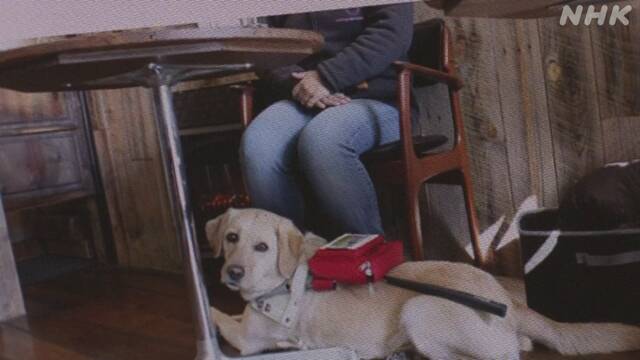According to the survey results, about 40% of visually impaired people feel that it is difficult to understand the social distance, and that they are confused about the new life of Corona.
This survey was conducted by the Japan Guide Dog Association, which promotes guide dogs, for about one month until the end of February, targeting about 230 guide dog users who are visually impaired. I interviewed.
According to this, as a result of multiple answers, "difficult to understand social distance" was the most common at 41%, "difficult to ask for support from others" at 22%, and "worried about the surrounding eyes because of touching products" was 21%. And so on.
In addition, 18% of respondents said that their voices and support from those around them decreased, highlighting that they are confused about their new lifestyle as infection control is required.
Masanori Kanai, director of the Japan Guide Dog Association's Visually Impaired Support Department, said, "As a new lifestyle is required, visually impaired people need support from the surroundings, such as calling out. It's a step ahead, "he said."
I'm worried about the pedestrian crossing due to the decrease in crowds and voices
Some people say that after the spread of the new coronavirus, the number of people around them has decreased, and the chances of feeling the danger of life when going out have increased.
Makoto Yamamoto (53), who lives in Tokyo, lost his eyesight when he was in junior high school and has been living with a guide dog for 12 years.
It is said that it is difficult to find the location of the alcohol disinfectant even when entering the store in ordinary shopping, and when lining up in front of the cash register, it is often confusing because it is difficult to get a sense of distance from the person in front.
Mr. Yamamoto is most worried when crossing a pedestrian crossing.
This is because the timing of crossing cannot be known unless the traffic light produces sound.
Dogs have very few eye cells that sense color, and it is difficult to distinguish the color of the signal.
Therefore, Mr. Yamamoto decides whether to rely on the sound of cars and the sound of people's footsteps.
Even so, before the spread of the infection, I didn't feel much anxiety, as people waiting for the signal told me when to cross.
However, after the spread of the infection, the number of people has decreased and the number of people calling out has decreased.
When I was about to cross the pedestrian crossing, I heard the sound of sudden braking and returned to the sidewalk in a hurry.
Mr. Yamamoto said, "I'm still red when I try to cross over, and sometimes I'm afraid. I'm relieved if you can feel free to ask me," Are you okay? "Or" It's blue. " I will. "

